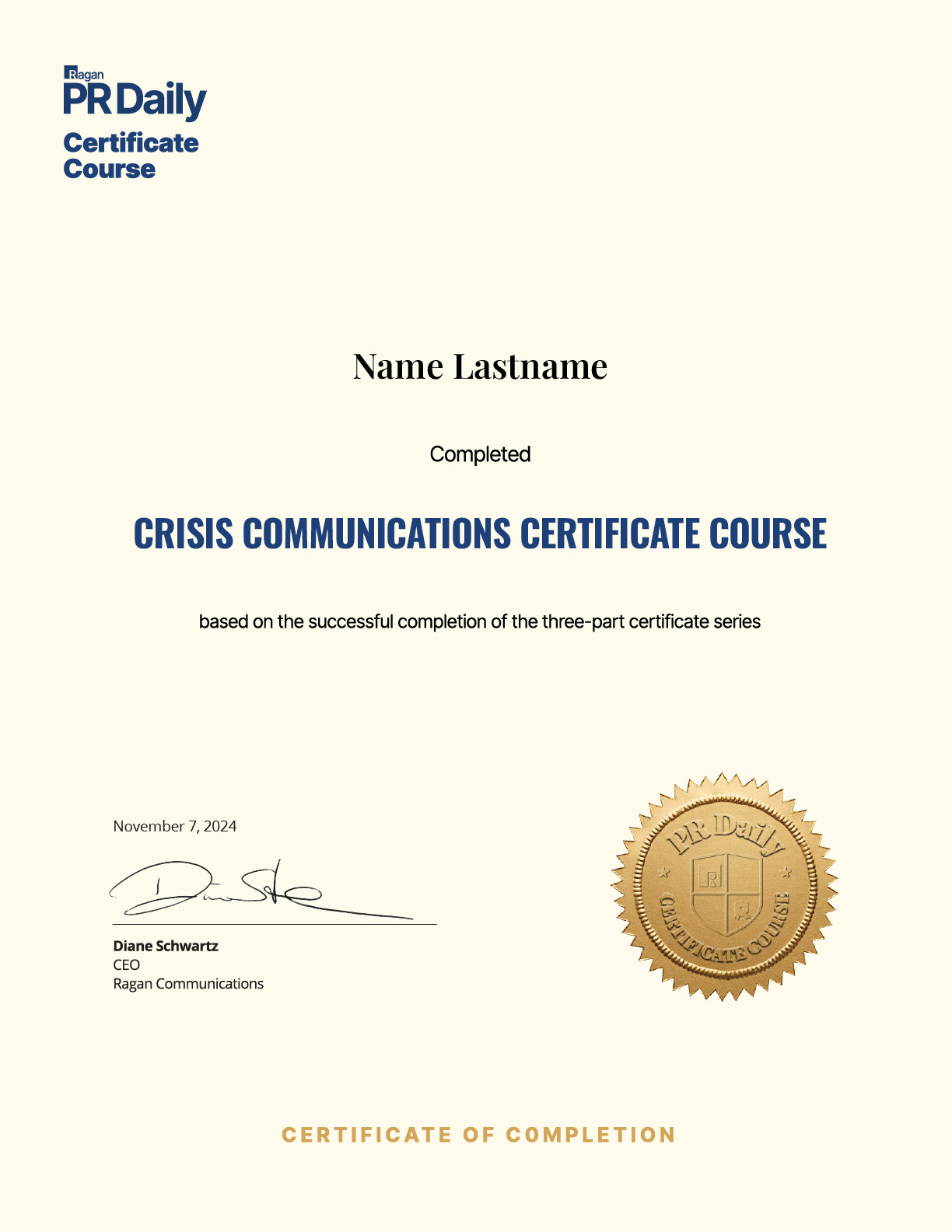Crisis Communications Certificate Course
Preparation, Measurement and Risk Mitigation
October 24, 31 & November 7 | 1-3 p.m. ET
Three consecutive modules
Register for this immersive three-part certificate series to help develop crisis communications strategies, discover tools and tactics for better crisis management, and forge ahead through unexpected emergencies.
Let’s be real: It’s tough out there. Social media minefields, M&A drama, climate emergencies, a contentious political landscape, rogue executives and more keep communicators’ heads spinning.
Every communicator will encounter a crisis at some point in their career — and some will do so on a weekly basis. The key is to anticipate challenges and have a plan for every eventuality. This certificate course is the balm you need to chart a path to peace and convert chaos to control when it comes your way.
Communications and PR experts will assemble to explain their secrets to proactive planning and in-the-moment responses. You’ll learn to identify potential crises, leverage early warning systems, and manage media relations with finesse, and you’ll leave equipped with actionable strategies for keeping employees, executives, boards and the public informed and ready to face the future.
Learn the art of measuring sentiment, building trust, safeguarding reputation and collaborating with leadership in the face of adversity. PR Daily’s expert instructors will guide you through practical frameworks, case studies, and interactive discussions to ensure you emerge with tangible skills and confidence. Whether you're a seasoned communications professional or new to crisis management, join us to become a trusted guardian of your organization, its leadership, its employees and its customers.
You'll learn to:
- Manage and protect your organization’s reputation in the face of adversity.
- Anticipate and prepare for crisis situations before they happen.
- Develop frameworks for critical decision-making in urgent situations.
- Craft crisis communications that keep stakeholders and audiences informed.
- Learn what tools communicators use to monitor situations that could turn into a crisis.
- Build trust and communicate authentically before, during and after a crisis.
- Determine when, how and where to speak up during emergencies.
CURRICULUM
Hone your crisis comms skills in just a few short weeks. You’ll receive handouts, a certificate of completion and resources you can apply in your organization and your career.
CLASSROOM MATERIALS
(Exclusive for Attendees)
- Crisis Holding Statement Creator
- Crisis Planning Checklist to Minimize Disruption
- Cyber Attack Communications Checklist
- Ragan’s Crisis Communications Guidebook
- Change Communications in a Volatile World
- 5 Stages of Crisis Recovery and Reputation Repair
Top 8 skills you’ll master:
- Prepare for the Unexpected: Strategies to develop materials, processes and workflows so that you’re ready before a crisis arises.
- Craft the Message: Articulate your organization's values and response effectively across digital platforms.
- Optimize Crisis Responses: Techniques and approaches to ensure your crisis communication efforts are aligned with your objectives and resonate with your audience.
- Build (and Rebuild) Trust: Understand your audience and what they need to know in order to get through an emergency and gain confidence in your organization.
- Prompt Action: How to secure approvals and encourage swift and decisive actions in response to crisis communications.
- Harness AI Tools: Leveraging artificial intelligence technologies to streamline crisis communication processes and improve response times.
- Manage Reputation and Risk: How to influence public and stakeholder perception of your organization, even through the most difficult PR challenges.
- Monitor and Evaluate: Using monitoring tools and metrics to track the effectiveness of crisis communication efforts and make informed adjustments as needed.
Top reasons to attend this virtual certificate course
- Strategies for anticipating crises before they happen and developing a plan for unavoidable situations.
- How to create frameworks and craft messaging to help your organization get through emergencies and PR crises.
- Tips for coaching and working with leadership to ensure that your entire organization can move ahead.
- Advice on what tools and technology to use to develop effective crisis communications swiftly and efficiently.
- Ways to identify what your audience needs to hear from your brand in the most challenging times.
- How to keep an ear to the ground to understand your audience and avert potential crises.
- Identify the right metrics to help you understand what needs to be done before, during and after a crisis to keep people safe, informed and confident in your organization.
Secure your seat today for this exclusive crisis communications course offered by Ragan and PR Daily, and level up your copy, tracking, tools and tactics.
Regular Rate
$1099
Ragan Insider Member
$999
Nonprofit/Gov
$949
Phone registrations and group pricing: For group orders please contact our customer service team at 800-878-5331 or cservice@ragan.com
If you can’t attend one or more of the modules live, you will receive the on-demand versions to complete the course.
WHO ATTENDS
Communications and public relations professionals from these organizations have earned certificates:

















